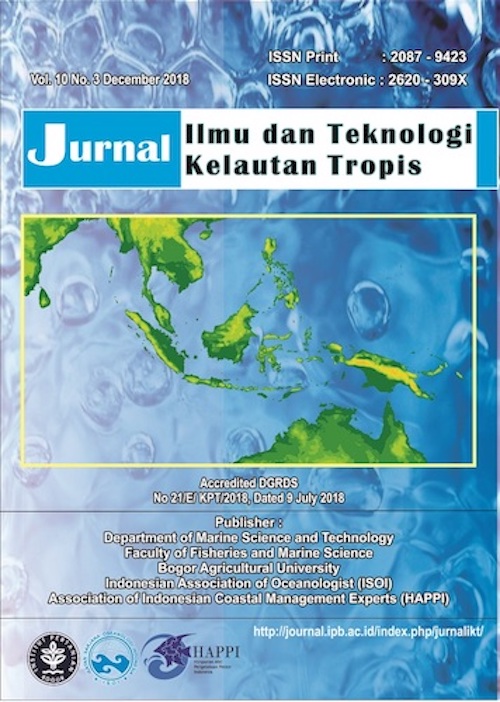SISTEM SOSIAL EKOLOGI KAWASAN DESA PESISIR KABUPATEN SUBANG
Abstract
ABSTRAK
Interaksi sistem sosial - ekologi di desa pesisir sering menimbulkan permasalahan, mulai dari menurunnya kualitas ekologi hingga terjadinya konflik sosial. Penelitian ini bertujuan untuk menganalisis sistem sosial - ekologi yang terdapat di Desa Blanakan, Desa Tanjungtiga, Desa Rawameneng, dan Desa Mayangan serta mengetahui jaringan konektivitas sistem sosial - ekologi dari desa pesisir yang terintegrasi. Data yang dikumpulkan berupa data primer dan sekunder terkait sistem sosial dan sistem ekologi, analisis data dilakukan secara deskriptif kuantitatif dan spasial deskriptif. Hasil penelitian menunjukkan bahwa sistem sosial – ekologi Desa Blanakan, Desa Tanjungtiga, Desa Rawameneng, dan Desa Mayangan tersusun atas jaringan sumberdaya berupa sumberdaya ikan, sumberdaya ekosistem, sumberdaya lahan, dan sumberdaya air yang digunakan oleh nelayan, petani, dan masyarakat umum. Keberlanjutan pemanfaatan sumberdaya didukung oleh ketersediaan infrastruktur yang disediakan oleh pemerintah dan swasta. Jaringan konektivitas sistem sosial - ekologi dari integrasi desa pesisir menunjukkan bahwa sistem sosial antar desa pesisir terkonektivitas melalui interaksi pendidikan, kelembagaan nelayan, pelayaanan kesehatan, dan interaksi lainnya, sedangkan interaksi sistem ekologi terkonektivitas melalui jaringan fishing ground dan pemanfaatan ekosistem mangrove secara bersama terutama antara Desa Blanakan dan Desa Mayangan.
ABSTRACT
The interactions of the socio-ecological systems in the coastal villages often create problems, ranging from the declining ecological quality to social conflicts. This study aimed not only to analyze the socio-ecological systems in the villages of Blanakan, Tanjungtiga, Rawameneng, and Mayangan, but also to find out the connectivity network of socio-ecological systems of the integrated coastal villages. The data collected included primary and secondary data related to social and ecological systems. The data analysis was performed in descriptive-quantitative and descriptive-spatial manners. The results showed that the socio-ecological systems of Blanakan Village, Tanjungtiga Village, Rawameneng Village, and Mayangan Village were composed of resource networks such as fish resources, ecosystem resources, land resources, and water resources used by fishermen, farmers and general public. The sustainable utilization of the resources was supported by the availability of infrastructure provided by the government and the private sector. The connectivity network of socio-ecological ecosystems of the integrated coastal villages showed that the social systems among coastal villages were connected through educational interactions, fishermen institutions, health services, and other interactions, while the interaction of the ecological system was connected through fishing ground networks and the shared utilization of mangrove ecosystems, especially between Blanakan Village and Mayangan Village.
Authors
This work is licensed under a Creative Commons Attribution 4.0 International License.
Jurnal Ilmu dan Teknologi Kelautan Tropis i is an open-access journal, meaning that all content is freely available without charge to the user or their institution. Users are allowed to read, download, copy, distribute, print, search, or link to the full texts of the articles in this journal without needing to request prior permission from the publisher or the author.
All articles published by Jurnal Ilmu dan Teknologi Kelautan Tropis are licensed under the Creative Commons Attribution 4.0 International License. This allows for unrestricted use, distribution, and reproduction in any medium, provided proper credit is given to the original authors.
Authors submitting manuscripts should understand and agree that the copyright of published manuscripts is retained by the authors. Copyright encompasses the exclusive rights of authors to reproduce, distribute, and sell any part of the journal articles in all forms and media. Reproduction of any part of this journal, its storage in databases, and its transmission by any form or media is allowed without written permission from Jurnal Ilmu dan Teknologi Kelautan Tropis.


